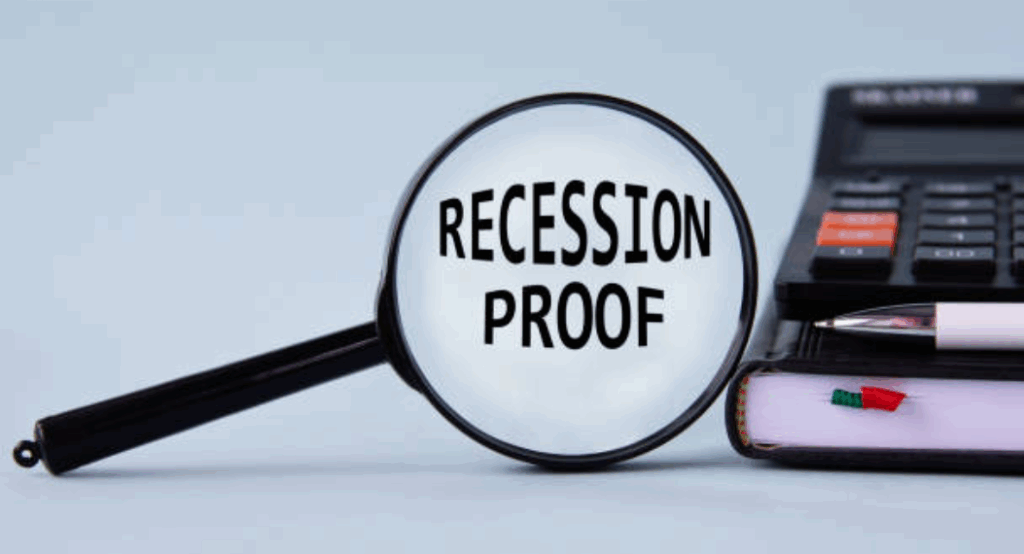The word “recession” strikes fear in most industries. It means layoffs, hiring freezes, budget cuts, and shaky futures. In recent years, we’ve watched entire sectors – from tech to retail – crumble under economic pressure.
So, it’s no wonder professionals everywhere are asking the same question:
“Is there such a thing as a truly recession-resistant career?”
The answer is yes, and one of the most enduring, stable, and overlooked options is a career in insurance.
While other industries downsize during downturns, insurance often expands. When families and businesses feel financially vulnerable, they don’t drop insurance – they depend on it. That reliability makes the insurance field one of the few true recession-proof careers available today.
This article will unpack what makes the insurance industry so resilient, and why it might just be the best career choice in uncertain economic times.

Section 1: What Is a Recession-Resistant Career?
Let’s start with the basics. A recession-resistant career is one that:
- Maintains demand during economic downturns
- Provides consistent income potential regardless of the stock market or GDP
- Is built on essential services that individuals or businesses can’t live without
Many traditional careers, like real estate, advertising, or luxury retail, rely heavily on people having money. But recession-resistant careers thrive because people still need them, even when budgets are tight.
Common examples include:
- Healthcare (doctors, nurses)
- Utilities (electricians, plumbers)
- Public safety (firefighters, police)
- And yes – insurance professionals
Insurance sits uniquely in this category because it doesn’t just survive when the economy turns – it often thrives.
Section 2: Why Insurance Is Always in Demand
During tough financial times, people tend to pause, panic, or protect. They stop spending on non-essentials.
But what they don’t cut is protection.
Think about it:
- When money is tight, families still want life insurance to protect their kids.
- Businesses still need liability and property coverage to stay afloat.
- Homeowners still need coverage for disasters or theft.
- And everyone wants health coverage to avoid medical bankruptcy.
In fact, during recessions, people are often more aware of risk. They’re thinking:
“If something happens to me, can my family survive financially?”
“Can I afford to replace my car or home without insurance?”
“What will happen if I lose my job and get sick?”
These questions increase demand for risk mitigation tools, and insurance is one of the most trusted tools on the market.

Section 3: Historical Proof - How Insurance Performs in Every Economic Cycle
To understand why insurance is considered one of the most recession-proof jobs, just look at how it has weathered recent economic downturns:
The 2008 Financial Crisis
- The housing market collapsed.
- Millions lost jobs in banking, construction, and real estate.
- Yet, insurance agents remained employed, and many thrived.
- Life, health, and home insurance stayed in high demand.
- The insurance industry’s total employment dropped less than 1%, compared to 5%+ in other industries.
The COVID-19 Pandemic (2020–2022)
- Airlines, restaurants, retail chains, and tech startups all faced closures and layoffs.
- But insurance was declared an essential industry.
- Agents shifted to virtual appointments and remote work – quickly and successfully.
- Many companies, like the Delaney Agency, reported zero layoffs and continued to grow.
Current Economic Slowdowns (2023–2025)
- As inflation and interest rates create new uncertainty, many industries are once again downsizing.
- Meanwhile, insurance careers are expanding, especially in health, life, and retirement planning.
- Licensing-based opportunities have surged, and digital platforms have made entry into the field easier than ever.
Section 4: What Makes the Insurance Career So Stable?
Now that we’ve established insurance as a consistent performer in tough economies, let’s break down why it works so well.
1. Essential Nature of the Product
Insurance isn’t a luxury – it’s a necessity. Even in financial hardship, people don’t cancel life insurance or car insurance. In fact, new policies often increase during times of fear.
2. Recurring Revenue Models
Many insurance agents earn from policy renewals, meaning their income is partially residual. That creates stability even during slower new sales months.
3. Scalable, License-Based Career Path
Once licensed, an agent can scale income without a huge upfront investment. You don’t need a storefront, inventory, or a team to start.
4. Remote and Virtual Sales Enablement
Today, agents can operate entirely online. Zoom, digital signatures, and cloud CRMs mean the business is mobile and crisis-proof.
5. Government-Regulated Protections
Insurance companies are regulated by state Departments of Insurance, meaning they have financial reserves and operational standards to keep payouts flowing, even in recession.

Section 5: How Insurance Compares to Other “Safe” Careers
Let’s be honest – every career has risks. But when it comes to recession-resistant careers, insurance compares favorably with other common options:
Career Path | Entry Cost | Income Ceiling | Remote-Friendly | Recession Resilience | Scalability |
Healthcare | High (med school) | Moderate (salary cap) | No (in-person required) | High | Low |
Tech | Moderate (bootcamps) | High | Yes | Moderate | Moderate |
Education | Low to Moderate | Low | No | Moderate | Low |
Trade Jobs | Low to Moderate | Moderate | No | High | Low |
Insurance Sales | Low (license fees) | High (uncapped) | Yes | Very High | High |
This makes insurance not only a recession-proof career, but also one of the most flexible and scalable paths available.
Section 6: Success Stories in Recession
Take the Delaney Agency, for example. During the COVID years, when millions were laid off, the agency:
- Made a full pivot to remote work within weeks
- Hired and trained dozens of new agents online
- Reported record-breaking policy sales during 2020–2021
- Continued growing in 2022–2025, while many industries shrank
These weren’t anomalies – they were proof points of a business built for stability.
Many of the agency’s top performers didn’t even come from sales backgrounds. Some were teachers, nurses, service workers, or corporate professionals who wanted something more stable and scalable.
Their stories show what’s possible when the right opportunity meets the right time – and insurance has never been more timely.
Section 7: Debunking the Myths Around Insurance Careers
Despite its proven stability, many people hesitate to consider a career in insurance because of outdated or misinformed beliefs.
Let’s address the most common myths that stop capable professionals from entering one of the best recession-proof careers available.
Myth #1: “Insurance Is Just Another MLM”
This is probably the most damaging misconception. While there are a few bad actors in every industry, legitimate insurance agencies are licensed, regulated businesses, not multi-level marketing schemes. You don’t make money by recruiting your friends. You earn income by helping real families secure real protection.
Especially at credible organizations like the Delaney Agency, training is focused on service, not sales tricks. Agents are compensated fairly for the work they do and are guided by compliance standards and ethical practices.
Myth #2: “Only Natural-Born Sellers Succeed in Insurance”
Great insurance agents aren’t slick salespeople. They’re good listeners, educators, and connectors. The most successful agents focus on understanding their clients’ goals and guiding them toward smart, protective decisions.
Many top performers in the field started out as teachers, nurses, and hospitality workers – professions rooted in empathy, not sales. And because insurance offers comprehensive training and mentorship, your starting skill level doesn’t determine your ceiling.
Myth #3: “Insurance Is a Dying Industry”
Wrong again. If anything, insurance is evolving faster than ever. Thanks to digital platforms, AI tools, and new types of policies (e.g., cyber insurance, gig economy coverage), the field is expanding to meet modern needs.
Plus, let’s not forget – insurance is tied to every stage of life:
- Buying a car or home? You need coverage.
- Starting a family? Life insurance becomes critical.
- Retiring? Long-term care and annuity products enter the conversation.
This career evolves with people – and that means it evolves with the world.

Section 8: The Emotional Value of Insurance During Recession
There’s a reason insurance remains relevant even in financial turmoil: it’s not just financial – it’s emotional.
During a recession, people feel exposed:
- Will I have enough to support my family?
- What happens if I get sick or injured and can’t work?
- Will my children be okay if something happens to me?
Insurance provides an answer to those questions – and that answer is relief.
As an agent, you’re not just selling policies. You’re giving people:
- Peace of mind
- A sense of control in uncertain times
- A way to prepare instead of panicking
This emotional reassurance becomes even more valuable when fear is high and stability feels rare.
Section 9: How the Digital Shift Makes Insurance Future-Proof
The old image of an insurance agent knocking on doors with a briefcase is long gone.
Today’s agents are fully mobile, highly digital, and supported by cutting-edge tools.
At companies like the Delaney Agency, agents are trained in:
- Running appointments over Zoom
- Managing clients with CRMs and mobile dashboards
- Using AI to generate leads and schedule follow-ups
- Sending digital applications and contracts with e-signatures
This tech-forward approach makes insurance future-ready. It also means:
- Low overhead costs (no office needed)
- Greater flexibility (work from anywhere)
- Faster scalability (grow without physical limitations)
Even during lockdowns or market shifts, this digital-first model thrives.

Section 10: The Power of Training and Mentorship
One of the best things about building an insurance career in a recession is you’re never doing it alone – if you’re with the right agency.
The Delaney Agency, for instance, doesn’t just throw new agents into the deep end. It provides:
- Structured onboarding and licensing prep
- Hands-on coaching from top leaders
- Access to a nationwide community of peer mentors
- Weekly training calls and digital resource libraries
- A clear path from agent to leader
This kind of support reduces the learning curve dramatically and gives agents the confidence to start strong, even in an unstable economy.
In fact, mentorship is one of the reasons so many new insurance agents in SC and across the country have found fast success during challenging economic periods.
Section 11: The Advantage of Recurring Income in a Recession
Here’s another major reason why insurance is a recession-resistant career: recurring income.
In most jobs, you trade time for money.
If you don’t work, you don’t earn. But in insurance, especially life and health policies, you often earn renewal commissions – meaning each sale continues to pay you over time.
This has two major benefits:
- Income stability during slow months
Even if you don’t make a new sale this week, your past sales still generate income. - Compounding growth over time
With each new policy, your monthly baseline income increases.
In a volatile job market, this kind of residual revenue model gives agents something most employees don’t have: predictability.

Section 12: Why Insurance Careers Are Thriving in the Carolinas
South Carolina has become a hotspot for insurance agents, especially for those seeking stable careers in recession.
Why?
- The state has a growing population (more people = more policies needed)
- Low cost of living makes entry-level commissions go further
- Insurance licensing is accessible with low fees and quick timelines
- Agencies like Delaney have a strong presence and proven systems
Whether you’re exploring insurance careers in South Carolina or simply looking for a recession-proof career path, the infrastructure is there, and the demand isn’t going away.
Section 13: Can Insurance Agents Really Thrive During Recessions?
Absolutely – and not just survive, but thrive.
Unlike most industries where professionals are forced to play defense during recessions, insurance agents often go on offense. Why? Because economic fear sharpens awareness. People start thinking more seriously about:
- Life insurance
- Mortgage protection
- Retirement planning
- Business liability
- Health and disability coverage
When the economy is thriving, people are often distracted by growth. But when it contracts, they focus on preservation. That’s when insurance becomes a top priority.
And that’s when agents who are well-trained, empathetic, and trustworthy become invaluable.
Agents who consistently educate and serve during downturns build long-term trust, which leads to:
- More referrals
- Higher client retention
- Larger policies
- Faster business growth
In short, economic downturns may slow the world, but for good agents, they speed up opportunity.

Section 14: Corporate Job vs. Insurance Career in a Recession
Let’s break down how insurance stacks up against a typical 9–5 job when the economy turns south.
Feature | Traditional Job | Insurance Career |
Job Security | Employer-dependent | Client-dependent (diversified) |
Income Control | Fixed salary | Scalable and residual |
Layoff Risk | High in downturns | Low, self-directed |
Mobility | Location-bound | Remote, digital |
Growth Opportunity | Promotion-based | Performance-based |
Recession Response | Cost-cutting | Demand increases |
While corporate jobs can offer routine and structure, they’re often fragile in volatile markets. Layoffs can come suddenly, and income is capped. In contrast, insurance careers offer ownership, and ownership means control.
In a career like the one offered at the Delaney Agency, no one can “fire” you – because you’re building your own business, supported by systems and mentorship.
Section 15: The Future of Insurance in the Age of Economic Uncertainty
As AI transforms industries and remote work becomes the norm, insurance is entering a golden age. The field is evolving in ways that make it more accessible and sustainable than ever before.
Trends to Watch:
- Digital Policy Management: Clients can buy, manage, and renew policies online, making your workflow seamless.
- Virtual Client Acquisition: Zoom, social media, and CRM platforms help agents reach more people faster.
- Product Diversification: More insurance types mean more ways to serve different niches – from cyber insurance to pet coverage.
- Regulatory Strength: As an industry backed by compliance, state-level regulation ensures trust and longevity.
Most importantly, insurance cannot be automated out of existence. It relies on human trust, human relationships, and human decision-making, especially during life’s hardest moments.
In a world of disappearing jobs, this one is built to last.

Section 16: Final Takeaway — Stability Isn’t Found. It’s Built.
The biggest myth people believe is that they need to “find” a stable job.
But in today’s economy, stability isn’t found – it’s built.
And the way to build it? Choose an industry that is:
- Always in demand
- Based on service, not trends
- Protected by regulation
- Scalable by design
- Resilient across every cycle of the economy
Insurance checks every one of those boxes.
At the Delaney Agency, new agents aren’t just given a script – they’re given a system, a mentor, and a mission. Whether you’re just starting out or transitioning from a shaky corporate role, there’s room for you here to create impact and income, without waiting for the “right time.”
“We don’t promise easy. We promise it’s worth it.
If you want a career that can weather every season, you’re in the right place.” – Brian
FAQs
1. Why is the insurance industry considered recession-resistant?
It provides a financial safety net that people still need during downturns. Whether protecting income, property, or lives, insurance remains essential – even when people are cutting back on everything else.
2. How does the insurance industry survive economic downturns?
Demand for protection increases during recessions. People become more aware of risk and want security. This drives demand for life insurance, health coverage, business insurance, and more – keeping agents in business even as other industries shrink.
3. What makes insurance a stable career even during a recession?
Low startup costs, recurring income, and consistent consumer demand. Licensed agents can work remotely, use tech tools, and scale at their own pace – all while providing a product that never goes out of demand.
4. Can insurance agents thrive in a recession?
Yes – and many do. The most successful agents actually see growth during tough economic times because they meet clients at a moment of need. With the right training and mindset, a recession becomes a launchpad, not a limitation.
5. How does insurance remain profitable during economic uncertainty?
Insurance companies operate with long-term financial models and strict state regulations. Premiums provide predictable revenue, and agents earn commissions and renewals even when other industries stall. That consistency translates into a profitable, sustainable career for those who choose it.
Conclusion: Choose the Career That Doesn’t Crash with the Market
The next time the economy takes a hit – and it will – ask yourself this:
Will my job survive? Or will I need to start over again?
In insurance, you’re not just preparing others for life’s uncertainties. You’re preparing yourself. You’re building a business on the most recession-resistant foundation there is: trust, service, and stability.
If you’re tired of waiting for your career to feel safe, it’s time to build one that is.
Ready to learn more?
Start your journey today with the Delaney Agency – where resilience, leadership, and impact are more than buzzwords – they’re how we grow.
Explore our opportunities here →









